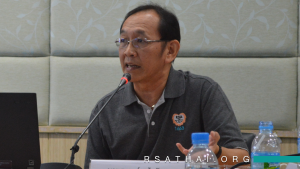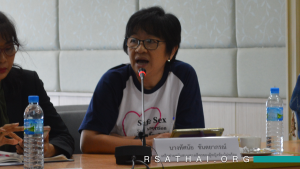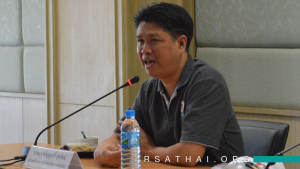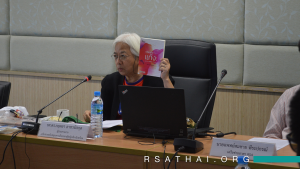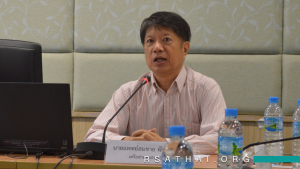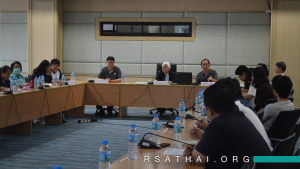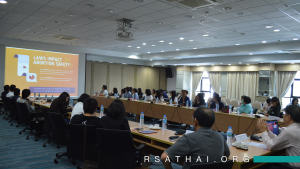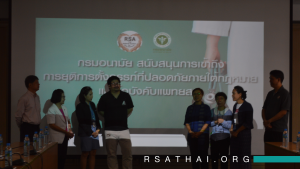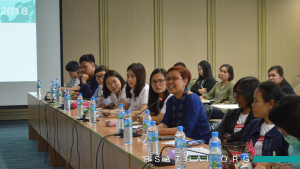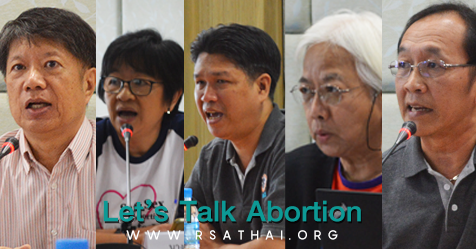
On September 26, 2018, from 9:00 AM to 12:00 PM, the Network for Supporting Women’s Choices in Unplanned Pregnancies and the RSA Volunteer Network organized a discussion “Let’s Talk Abortion” on the occasion of International Safe Abortion Day, September 28, at the Sanjai Meeting Room, Office of the National Health Commission, Ministry of Public Health.
Assoc. Prof. Dr. Kritaya Archavanitkul, coordinator of the Network for Supporting Women’s Choices in Unplanned Pregnancies, stated that the main issue of abortion in Thai society from past to present has two key points: The first is about the mindset embedded in Thai criminal law, which views abortion as a crime, and women who are unprepared for pregnancy and seek abortion are criminals, guilty under Section 301, which is the only section in the Penal Code that punishes only women. Other sections related to various offenses use the term ‘person,’ which includes both women and men. This section punishes women even though there is no victim because it is a decision made about their own bodies. What the network wants to drive is the repeal of Section 301, but personally, I would like to see all abortion-related laws repealed, namely Sections 301-305. How and to what extent abortion can be performed should be a matter of health regulations.
The second point is that even though current law provides some exceptions for women who are unprepared for pregnancy to have an abortion in three main cases: (1) The pregnancy endangers the physical and/or mental health of the pregnant woman, (2) The pregnancy results from a criminal offense under Section 276, which is causing a girl under 15 years old to become pregnant, whether the girl consents or not, Section 277 is rape, Sections 282, 283, and 284 are using deceit to satisfy lust, resulting in the woman becoming pregnant, and (3) The fetus has severe disabilities. The person performing the abortion must be a doctor. In reality, even women with unplanned pregnancies due to these conditions find that many doctors in state medical facilities refuse to perform abortions, forcing women to seek illegal services or use unsafe drugs, endangering their lives. The RSA volunteer network has helped alleviate this problem somewhat, but in terms of proper service systems, the state, through the Ministry of Public Health, should push for safe and legal abortion services to be available in all hospitals, prohibiting further refusals.
Mr. Somwong Uraiwatana, responsible for the 1663 AIDS and Unplanned Pregnancy Hotline, said that between October 1, 2015, and June 30, 2018, there were 52,370 people who received counseling services from the 1663 hotline regarding unplanned pregnancies. Of these, 29,191 knew they were pregnant, and 19,097 decided to terminate the pregnancy, accounting for 83.4% of those who were pregnant.
Specifically, from October 2017 to June 2018, 12,215 people with unplanned pregnancies received counseling from 1663, and 8,577 decided to terminate the pregnancy. Among these, 652 people, or 7.6%, revealed that they had terminated the pregnancy themselves before calling for advice, and among these, at least 36 had health problems of the mother or fetus that met medical criteria but were denied termination due to the hospital not providing abortion services.
“For women with unplanned pregnancies, there should be options for managing the problem because having options is better than having none. The more options there are, the better, as people will choose the best option for themselves. But currently, for women with unplanned pregnancies, there are almost no options,” said Mr. Somwong.
Dr. Somchai Peerakorn, a member of the RSA Volunteer Network (Referral system for safe abortion) and a retired WHO staff member, said that from his experience working on women’s mortality, deaths from unsafe abortion should not occur. In developed countries, the mortality rate from unsafe abortion is very low because they have good, quality, and safe service systems for women with unplanned pregnancies who want to terminate the pregnancy. If Thailand can make it so that women with unplanned pregnancies can access services without being dehumanized, it is believed that the severity of the unplanned pregnancy problem will decrease, and women will not rely on “underground” abortion services because they can receive services at hospitals.
“Hospitals should have a good system for providing services to women with unplanned pregnancies. When a woman walks in, she should know who she will consult with, what her options are, and if she decides, what the process will be to manage the problem. Just like with diabetes, when a patient goes for a blood sugar test, the hospital will have signs indicating the steps and health impacts if blood sugar levels are high for the patient to know. The issue of unplanned pregnancy should be handled similarly,” said Dr. Somchai.
Dr. Boonrit Sukrat, Deputy Director of the Bureau of Reproductive Health, Department of Health, Ministry of Public Health, added that the Department of Health supports policies to reduce unsafe abortions, such as supporting the inclusion of Medabon abortion pills in the essential drug list, supporting the RSA volunteer network, and pushing for the Prevention and Solution of Adolescent Pregnancy Act, B.E. 2559. This is not only about the safety of abortion but also for the good quality of life of women with unplanned pregnancies.
Mrs. Tussanai Khantayaporn, from the Network for Supporting Women’s Choices in Unplanned Pregnancies, said that although current law allows women who are unprepared to terminate a pregnancy, it is still a law that conflicts with rights and equality principles. She wants to communicate to society that abortion is not a criminal offense but a medical treatment aimed at preserving the life and safety of women. This afternoon, the network will submit a letter to the Constitutional Court to interpret whether the criminal law conflicts with rights and freedoms. The main content of the letter to be submitted for interpretation is to propose the repeal of Section 301 of the Penal Code because it conflicts with gender equality principles and affects women’s rights and freedoms in life and body. Sections 305, 301, and 302, which state that abortion can be performed by a doctor if due to the woman’s health and the pregnancy results from sexual offenses under criminal law, should include additional exceptions such as if the woman’s gestational age does not exceed 12 weeks, if the pregnancy affects mental health, if the fetus is disabled or at risk of genetic disease, and for the performer, medical personnel working under the supervision of a doctor should be added.
In addition to submitting a letter to the Constitutional Court, the Network for Supporting Women’s Choices in Unplanned Pregnancies and the RSA Volunteer Network will organize a campaign activity “Abortion is not a crime, women are not criminals” in front of the Constitutional Court after submitting the letter.

